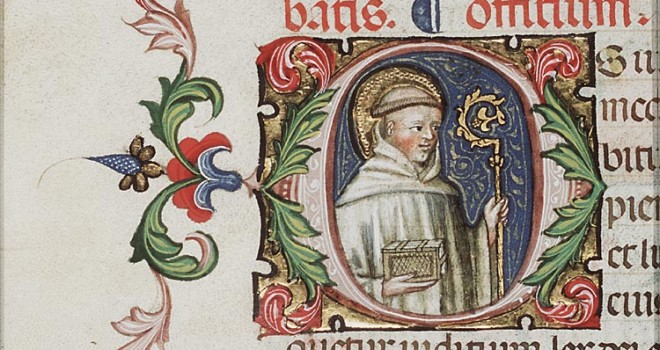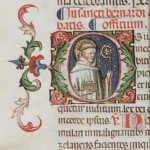Son. Brother. Priest. Hammer against heresies, promoter of crusades, and founder of monasteries. St. Bernard of Clairvaux, despite once referring to himself as a “noisy and troublesome frog”, lived a life packed full of intrigue and influence.
Born to Burgundy nobility in 1090, Bernard was the third of the aristocratic couple’s seven children. Well raised and pious, young Bernard very early on showed a strong devotion to Our Lady. He was sent to excellent schools, and paid particular attention to literature studies, the better for him to read and study the Bible.
Then, when he was 19, Bernard’s whole world changed. His mother, to whom he was intensely attached, died. In response, the young man considered withdrawing entirely from the world and spending the rest of his days in prayer and solitude. In one of those curious twists of fate, Bernard’s discussions about the virtues of monastic life were so compelling, that some 30 of his relatives and friends decided to join the man in a Benedictine monastery. Notions of solitude no longer viable, Bernard nevertheless devoted himself to his new life as a religious.
Shortly after joining the Benedictines, Bernard was sent off with 12 other monks to found a new house, named Clairvaux. In an attempt to discipline the flesh as much as possible, the living conditions at Clairvaux were so austire, so stringent, that Bernard himself fell ill. It was only submission to his superiors that compelled the future saint to make the needed changes, and the monastery grew in leaps and bounds. New members included Bernard’s father and all his brothers. The sole sister, Humbeline, was the only one to remain in the secular world, though she soon convinced her husband to give her permission to become a Benedictine nun.
As Bernard’s reputation grew, he was tapped to be the secretary at the Council of Troyes, where he threw his considerable influence in backing a fledgling organization within the Church- the Poor Knights of Christ and the Temple of Solomon. History more commonly calls them “the Knights Templar”, and before winning Bernard’s support, they were truly poor- both in resources and in power. Once Bernard championed them at the Council of Troyes, however, the group swiftly morphed into a formidable organization, arguably becoming the world’s first multinational corporation and innovating ideas that would evolve into our modern system of banking.
Bernard’s influence didn’t end there, however. In 1130, a schism broke out in the Church when two popes were elected following the death of Honorius II. Anacletus II, the candidate with the majority of cardinal support behind him, exiled Innocent II to France. King Louis VI convened a council of the French bishops, who selected Bernard to be the impartial judge in the matter of pope vs. antipope. Bernard found Innocent II to be the validly elected pope, and used all the skills of diplomacy at his disposal to get the world powers at the time to agree.
Catholics perhaps like to simplify their saints, imagining that the title means a person was void of all the complexity and contradiction that is the hallmark of humanity at large. St. Bernard would be a candidate for just this sort of whitewashing.
Bernard’s star continued to rise, and he was assigned to stamp out a number of heresies in France, including Catharism. His years of ascetic living, coupled with simple appearance and straightforward teaching, made a lasting impact on the heretics, and the majority of the heretical cults had died out within a year of Bernard’s arrival. The number of monasteries he helped found swelled into the hundreds. He founded the Cistercian Order, wrote numerous books on Mariology, theology, and helped lay the foundation for canon law. He was a tireless supporter for the Second Crusade, and when the endeavor failed miserably, he is said to have laid the blame for it on the sins of the Crusaders.
Catholics everywhere are familiar with the devotion to the Shoulder Wound of Christ, the wound Our Lord claimed in a vision was the most painful to bear during His Passion. It is St. Bernard that was privileged with that vision, and in response wrote a moving prayer that is still part of many faithful devotions.
O Loving Jesus, Meek Lamb of God, I, a miserable sinner, salute and worship the most Sacred Wound of Thy Shoulder on which Thou didst bear Thy heavy Cross, which so tore Thy Flesh and laid bare Thy Bones as to inflict on Thee an anguish greater than any other wound of Thy Most Blessed Body. I adore Thee, O Jesus most sorrowful; I praise and glorify Thee and give Thee thanks for this most sacred and painful Wound, beseeching Thee by that exceeding pain and by the crushing burden of Thy heavy Cross, to be merciful to me, a sinner, to forgive me all my mortal and venial sins and to lead me on towards Heaven along the Way of Thy Cross. Amen.
St. Bernard passed into eternal life in 1153, and was made a Doctor of the Church 1830, when Pope Pius XII declared him to be “the Last of the Fathers”.












